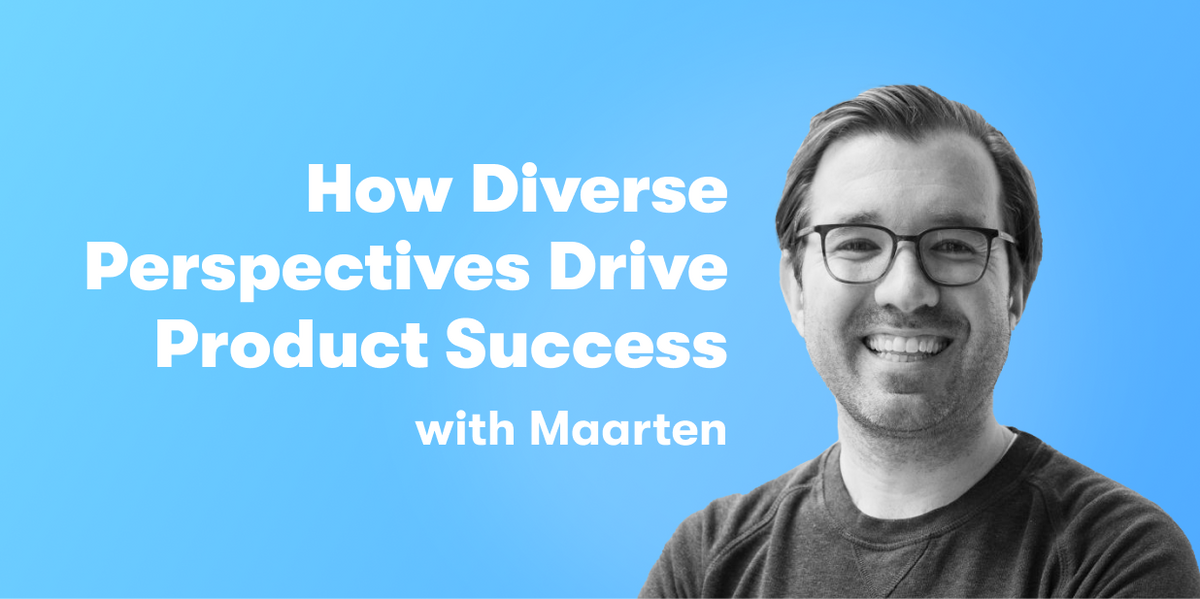How Diverse Perspectives Drive Product Success: An Interview with Maarten Dalmijn

Interview with Maarten Dalmijn
Meet Maarten Dalmijn, a product management leader turned consultant who has worked with numerous award-winning start-ups, scale-ups, and corporations in various roles. In this article, Maarten shares his story of reinvention and explains how his diverse experience has helped him excel as a product owner.
With a background in biology, functional genomics, and marketing, Maarten details his journey into product management and how he gained the necessary skills and perspective to excel in this field. He also discusses the importance of understanding different perspectives and collaborating with experts to solve complex problems as a product manager. Let's dive in!

Can you share with us your background and how it has influenced your career in product management?
My background seems like a drunkard’s walk (completely random), unless you know more about me. Here are some highlights:
- Bachelor in Biology at Vrije Universiteit Amsterdam
- Masters in Functional Genomics at Technical University of Delft
- First job as a Marketing Manager at a healthcare start-up
I knew I never wanted to work in Biology or in Functional Genomics. I did complete my studies, but more as a tick in the box, not because I really cared about it. I did my final industrial internship in marketing at a healthcare start-up and they offered me my first job as a Marketing Manager.
I already realized I wanted to work in Product after my first job as a Marketing Manager. I also realized how unlikely it was someone would hire me. Back in 2008, nobody wanted to hire me as a Marketing Manager, where I did have experience. Due to the crisis, they could hire better and more experienced people than me in marketing, let alone in product.
I then followed a stepping-stone approach over a period of more than 3 years to slowly enter the world of product:
- Software Tester
- Business Analyst & Scrum Master
- Product Owner at a start-up
When I was hired as a Product Owner for the first time, I felt ready, but the harsh truth was I absolutely wasn’t. But I was prepared to take on the challenge and felt confident I would learn quickly.
How did your experience prepare you for the role of product owner?
My different positions tell a story of reinvention. What made me good as a marketing manager, didn’t make me a good software tester. What made me good as a software tester, didn’t make me good as a business analyst. What made me good as a business analyst, didn’t make me good in product, and so on.
However, every experience helped broaden my perspective. As a marketing manager, I learned the importance of telling a good story. The facts matter as much as how they are presented to us and how they make us feel.
As a software tester, I saw all the mistakes everyone was making as well as all the mistakes caused by the system/way of working. It was a valuable learning experience on how not to do things (and also consequently how to do things!).
How has having a diverse background helped you in your product management career?
The fact that I had both experience with the business and as part of the development team as a tester helped because I was able to speak both languages and understand the development and business side of product development.
Great products are built by including many different and valuable perspectives. Being able to relate to all the different departments involved in building a product like marketing, sales, support, customer success, etc helps to achieve the best results.
What allowed you to better understand the different perspectives of the development team and the business team?
A good example is technical debt. Developers often deeply care about technical debt. The business usually doesn't really understand or care about technical debt. If you understand technical debt and the impact on things that business people do care about, then you can make sure it gets on the agenda and that there is buy-in for delaying specific features. But you can only do that if you understand their world.
That developers are scared when they make changes to the code is not something the CEO cares deeply about. The inability to innovate or bring new features quickly to market is something they do care about.
Do you think a product manager's educational background plays a significant role in their ability to excel in the role?
I believe what my background demonstrates is that it doesn’t really matter, as long as you’re curious and willing to learn. A position in product isn’t handed to you on a silver platter. There isn’t a single background that sets you up for success. You never know enough about all the different perspectives that are necessary to build a successful product. I’m still learning every day.
However, I feel uncomfortable with uncertainty and not knowing. I’m curious and eager to learn new things. That’s why I’m a great fit for working in product. I’m not scared by complex problems and I also am well aware that I don’t need to be an expert in everything. It’s more important that you’re great at collaborating with other experts, than that you’re the ultimate expert yourself.
I always compare working as a Product Manager to an orchestra conductor. As Benjamin Zander has said:
“The conductor of an orchestra doesn't make a sound. He depends for his power on his ability to make others powerful.”
When you work as a Product Manager, you don’t build the product. It’s your job to bring all those different perspectives together and make a successful product.
Can you give us an example of a complex problem you faced as a product owner, and how you collaborated with the other experts to solve it?
I worked as a Product Manager in finance, while I was clueless about finance. To succeed in my job, it was super important to meet regularly with stakeholders more knowledgeable than me in finance and let them directly interact with the whole team instead of letting me be the person in between parroting all their words. You don't have to be the expert, you do have to make sure the right expertise is included.
How can a product manager with a non-technical background bridge the gap between themselves and the technical teams they work with?
Have lunch with the developers. Ask them questions and try to understand their world. Learn how to code so you can better understand what they’re doing. You don’t have to become a coder, but understanding how you can write a simple script to fetch some data from an API already helps to better communicate with them.
What transferable skills do you think are crucial for a product manager to possess, regardless of their background?
The ability to eliminate. We’re much better at adding to make something better, we suck at removing things to make it better. That’s why we should relentlessly work on elimination.
“The ability to simplify means to eliminate the unnecessary so that the necessary may speak.”
- Hans Hofmann
How can a product manager approach the task of elimination?
We hate removing things because loss aversion kicks in. If you don't know what you can remove to make something better it usually means you lack understanding. The better you understand something, the better you understand the essence of why something works.
Of course, there are exceptions. It could also be that something is already so simplified that removing would take something away and make it worse.
What advice would you give to a product manager looking to gain experience in a new industry or vertical?
Take the leap. Industry experience is often overrated. You can gain usually gain that much quicker than Product Management experience. Though there obviously are exceptions. The problem is that companies often value industry experience too much.
In your experience, what challenges have you faced as a product manager with a non-traditional background, and how did you overcome them?
Understanding developers. When they started talking, in the beginning, they sounded like the Swedish chef from the muppets to me: “BORK BORK BORK BORK.” Over time, as I gained more understanding and technical knowledge, it began to make sense.
I invested the time to teach myself how to program and script. Whenever I didn’t understand something a developer was saying, I invested additional effort to talk to them and read articles to gain more context of what they were trying to communicate to me. It’s also important to find a developer who is better at communicating and explaining. Some are awesome technically, but not as great at explaining, and vice versa.
How do you effectively communicate with stakeholders in industries where you may not have prior experience or knowledge?
Spend a lot of time with them, and try to understand their world. What do they care about? Why? Whenever you hear acronyms or concepts you don’t understand, ask them questions and if they can explain them to you. Do some googling on those concepts, and try to understand why they are important. Then the next time you meet, ask them more questions and dig deeper.
To get them to care about your world, you have to understand their world. And that begins by asking questions and learning about the things they care about.
What are some of the benefits of having a diverse team when it comes to product management?
When your team lacks diversity, you will have more people with similar perspectives and similar backgrounds. Having similar perspectives means there is more risk of groupthink. You need people with different perspectives, who challenge each other, and provide another way of looking at things to get the best and most creative solutions.
What advice would you give to someone who is considering a career in product management but doesn't have a traditional background in the field?
I’m European, so this answer will probably be influenced by my geography and your mileage may vary depending on the market you’re applying in.
Whatever approach you take, it isn’t going to be easy. Some people get lucky but be prepared for a lot of hard work and rejections. I’ve been rejected hundreds of times before landing my first job in Product Management.
Some companies have graduate Product Management programs, though these are pretty limited in number. I’d try to get into one of those programs, though that also won’t be easy as they probably are flooded with applicants.
However, you can also take the stepping stone approach like I did. Try to take on Product-adjacent roles like QA, and BA and slowly try to obtain that coveted Product position you want.
Where to find Maarten
Maarten’s broad expertise allows him to provide a holistic approach to delivering value as a Product Management, Agile, and Scrum consultant. You can find out more about his consulting services here, and you can read his latest articles and subscribe to his newsletter here.




